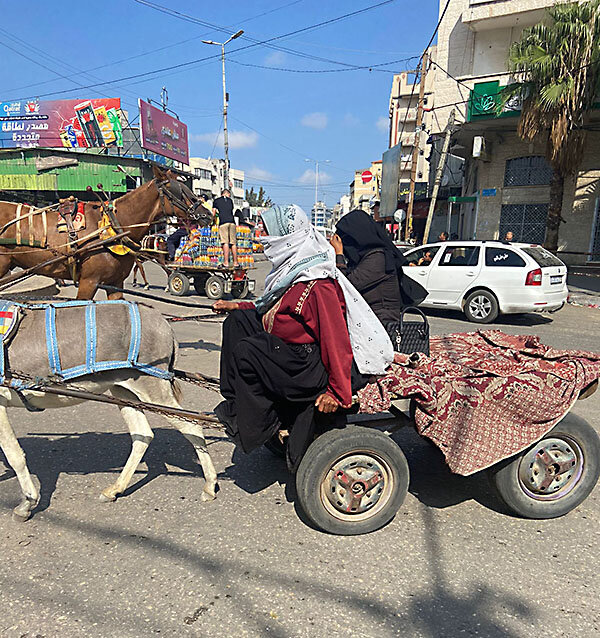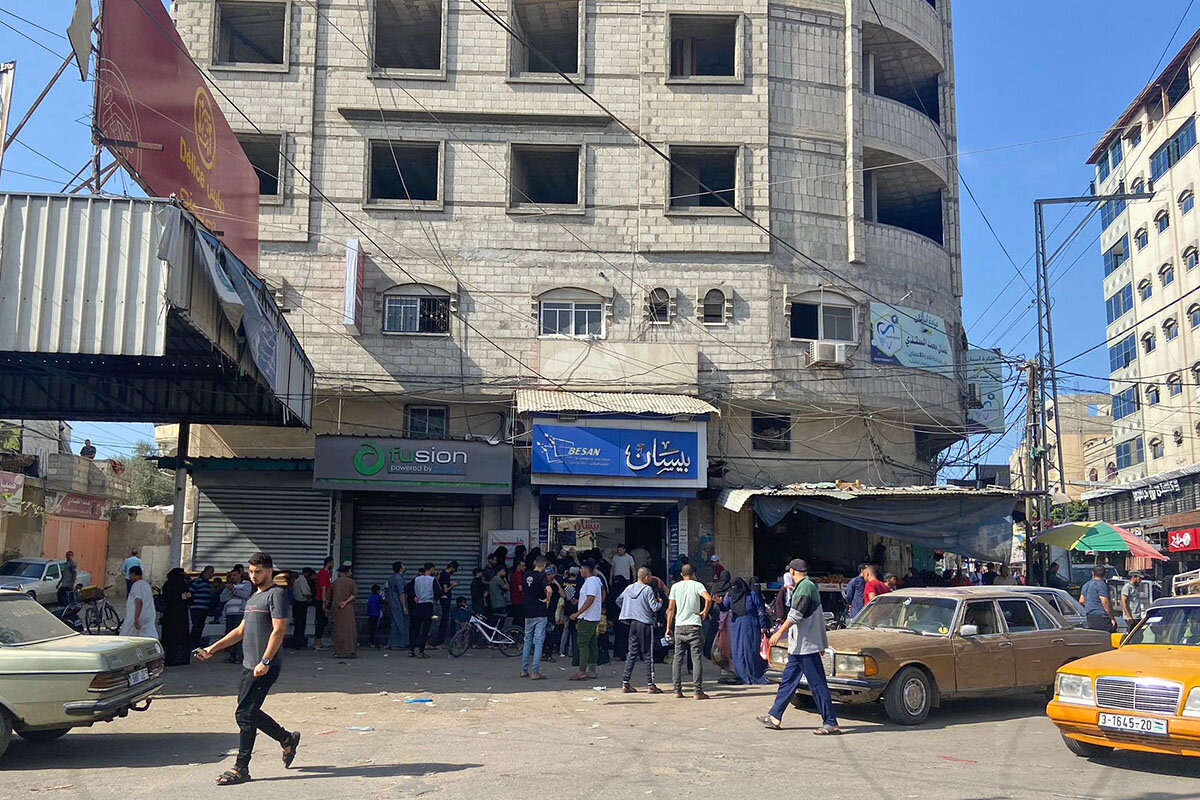‘When will this end?’ In Gaza, tough questions from kids.
Loading...
| Deir al-Balah, Gaza; and Ramallah, West Bank
One question gnaws at Shayma Abu Libda, as it gnaws at parents like her across the Gaza Strip. When will this war end?
“I kept telling my children, ‘It will only be a few days, and it will pass,’” says the mother of three, her voice heavy with uncertainty. “Now I am no longer able to answer them.”
Israel‚Äôs five-week bombardment of the Gaza Strip, its response to the savage Oct. 7¬Ýattack by Hamas, has killed more than 11,000 people, nearly half of them children, Gazan medical sources say.
Why We Wrote This
When will the war in Gaza end? Palestinian mothers sheltering from bombs and facing shortages of everything are finding it hard to answer that question, especially when it is posed by their children.
Flattening neighborhoods, the assault has also forced over 1.5 million Palestinian residents to flee their homes, according to estimates by the United Nations, which has warned that its humanitarian aid effort would come to a halt on Tuesday because of a lack of fuel for its trucks.
The Israeli army has declared daily “humanitarian pauses” allowing civilians in Gaza City, which is now on the front line, to escape the fighting and head south down one major traffic artery. But that road does not necessarily lead to safety: Shelling and missile strikes continue in the south of the Gaza Strip.
Food and medical supplies are dwindling. The few hospitals still functioning are admitting only emergency cases. Their morgues are overflowing: Humanitarian aid trucks are bringing in burial shrouds, and the dead are being placed in mass graves.
In Deir al-Balah and Rafah in southern Gaza, overcrowded with displaced families, the air is often thick with black smoke as refugees burn cardboard, dried palm fronds, and other refuse in an attempt to bake bread.
Families whose homes have yards allow displaced Palestinians in Gaza to make fires on which to bake – taking a single pita loaf as payment. Adding to the smoke is the smell of the burnt vegetable oil now being emitted by taxis that are using the oil in lieu of diesel.
None of Gaza’s bakeries have fuel or electricity to make bread, according to the U.N., which means that bags of wheat flour stocked in U.N. warehouses in Gaza cannot be put to use. On Monday the Food and Agriculture Organization declared the Gaza Strip “food insecure.”
Pink missiles with daisies
As the humanitarian crisis deepens, once mundane activities such as taking a shower, eating a sweet, or drinking a glass of clean water have become dreams to many people here. Finding a few hours of safety is a luxury, and during the lulls, families seek ways to hold out hope for their children – and themselves.
Ms. Abu Libda fled her home in northern Gaza¬Ýseveral weeks ago with her three children of ages between 1 and 6. First they sheltered in a school run by the U.N. Relief and Works Agency (UNRWA), which administers humanitarian aid in Gaza, but it was overcrowded, so they came south to live with Ms. Abu Libda‚Äôs mother and 21 other relatives.
With an opportunity now to rest, the reality of the war, and its impact on her children, is sinking in, she says. “I’m always wondering how I can wipe such bad memories and horrors from their minds.”
To take her older children’s minds off things, she gives them pens and paper. Using vibrant pinks, and decorating the image with daisies, they draw missiles landing on children.
“Sometimes I joke and laugh because I don’t want to think of rockets and want to forget what we are going through,” says Ms. Abu Libda. “But they cannot.”
Other city kids, such as Um Mohammad Malalhy’s six offspring, are always pointing out how strange things are in Rafah, where they are currently sheltering with hundreds of others in an UNRWA school, compared with their home in Gaza City.
But it is more than just the surroundings that are unfamiliar. The children can also distinguish between the artillery fire they heard at home and the missile fire they are now enduring.
‚ÄúI miss home. I miss my toys,‚Äù complains 7-year-old Arwa. ‚Äú≥€≤π±Ù±Ù≤πÃ˝Mama, let‚Äôs go home and live by ourselves.‚Äù
‚ÄúAt the beginning we used to tell the children, ‚ÄòTomorrow will be better; we will return,‚Äô‚Äù Ms.¬ÝMalalhy¬Ýsays. ‚ÄúI do not know when this war will end, and our whole apartment complex has been leveled. I am afraid that even once this war ends, we will have nowhere to go.
“This war is so different,” she adds. “It is more difficult than any previous war to the point that I cannot lie to my children.”
“Water is a luxury”
Nesma AlHalaby, a journalist and mother of two from Gaza City, has few answers for her children when they ask why they have had to move three times in the last four weeks despite her promises that each new place would be safe.
“Their questions do not stop: What will happen to us? Will we stay alive? Do we have to leave again to live safely? Why is everybody dying?” says Ms. AlHalaby. “I cannot answer most of those questions in a way that will calm their hearts and reassure them.”
She promises them, “When the war ends, I will buy you a cake, and whatever toys you want.”
But, in reality, “I am afraid of what will happen after the war,” she says.
At the Rafah UNRWA school, Arwa‚Äôs mother, Ms.¬ÝMalalhy, races to line up for the water truck to fill up containers, though more often than not the water is not clean enough to drink safely.
‚ÄúAll I want is to quench my thirst and my children‚Äôs thirst without worrying about falling ill,‚Äù Ms.¬ÝMalalhy¬Ýsays. ‚ÄúI do not want them to dehydrate, but clean water is a luxury we simply don‚Äôt have.‚Äù
Hala Baraka, a nurse at Al-Aqsa Hospital, which is one of the last few operational hospitals in the Gaza Strip, is surrounded by loss: A missile strike killed her sister, her nieces, and her nephews.
“I can’t help but feel that my sister and her family were somehow lucky to have been taken from us early on” in the war, Ms. Baraka says. “At least we had the opportunity to retrieve their bodies from the debris and bid them a proper farewell.”
Meanwhile, wounded people, and there are estimated to be 27,000 of them, are finding little relief.
People suffering from injuries such as broken legs, slipped discs, and burns say they cannot find antiseptic or painkillers at depleted pharmacies in southern Gaza, hobbling from pharmacy to pharmacy on makeshift crutches.
Outside an UNRWA school in Rafah, a 12-year-old boy with a broken arm stands by the road looking for a taxi to take him to the European Gaza Hospital; the handful of ambulances that still have fuel are reserved for those who are seriously wounded.
He waits silently, clutching his arm, tears rolling down his cheeks.¬Ý









